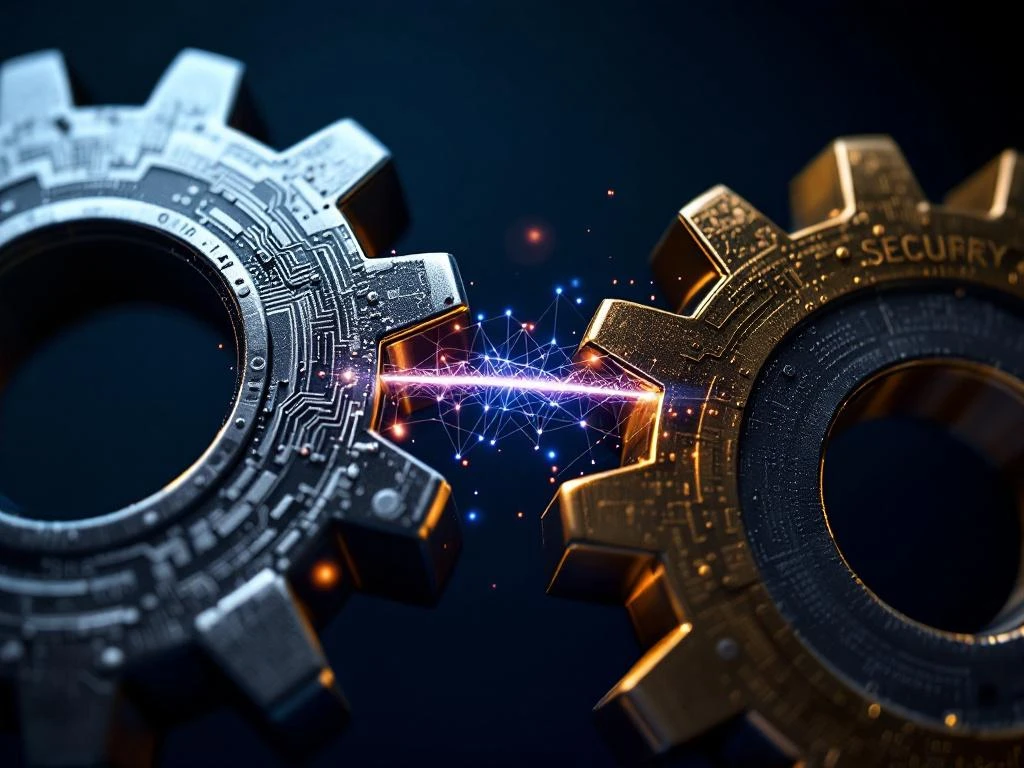

-
UK: +44 203 8876 770
US: 315 508 6500 - cybersecurity@thisisiceberg.com
-
8 Devonshire Square, London, EC2M 4YJ

Legal departments across industries are scrambling to understand how artificial intelligence fits into their operations. The traditional lawyer, equipped with contract law expertise and regulatory knowledge, suddenly finds themselves facing questions about algorithmic bias, data governance, and machine learning ethics. This shift isn’t just about adding new technology to existing processes. It’s about fundamentally rethinking how legal teams operate in an AI-driven business environment.
The demand for AI-technical counsel has grown dramatically as companies realise their standard legal professionals lack the hybrid expertise needed to navigate AI implementation safely and effectively. These roles require a unique blend of legal acumen and technical understanding that most traditional legal education simply doesn’t provide.
This guide explores why in-house legal teams are creating entirely new positions, what these AI-legal professionals actually do, and how you can build this capability within your organisation.
Traditional legal roles developed around established areas of law with well-defined precedents and regulatory frameworks. Contract negotiation, intellectual property protection, and regulatory compliance follow patterns that legal professionals learn through years of practice and education.
AI integration presents entirely different challenges that create significant gaps in traditional legal expertise:
| Traditional Legal Challenge | AI-Specific Complexity |
|---|---|
| Privacy compliance | Understanding algorithmic data processing methods and training processes |
| Risk assessment | Evaluating “black box” decision-making systems |
| Regulatory compliance | Implementing technical requirements in evolving AI regulations |
| Contract negotiation | Assessing technical capabilities and performance guarantees |
When your engineering team wants to implement machine learning algorithms that process customer data, traditional legal counsel might understand the privacy implications but struggle with the technical nuances of how the algorithm actually works. They can’t assess whether the data processing methods create compliance risks they haven’t encountered before.
The technical complexity creates blind spots. A standard privacy lawyer might approve an AI system based on the data collection methods, without understanding that the model’s training process could inadvertently create discriminatory outcomes. They lack the technical vocabulary to ask the right questions during vendor negotiations or internal project reviews.
Legal professionals excel at interpreting established law, but AI regulations are new and often require technical implementation knowledge. Key regulatory challenges include:
This creates practical problems when legal teams need to draft policies, review vendor contracts, or advise on product development. They end up relying heavily on technical teams for information, but lack the background to evaluate whether they’re asking the right questions or getting complete answers.
AI-technical counsel roles extend far beyond traditional compliance work. These professionals serve as bridges between technical teams and business stakeholders, translating complex AI concepts into legal and business risk frameworks.
Their core responsibilities span multiple critical areas:
| Responsibility Area | Key Activities |
|---|---|
| AI System Design | Architecture consultation, early-stage risk identification, proactive legal integration |
| Data Governance | Framework development, privacy compliance, data quality management |
| Bias Assessment | Testing protocols, bias detection, technical modification recommendations |
| Cross-functional Collaboration | Sprint planning, architecture reviews, product launch support |
Rather than reviewing completed systems for legal issues, they participate in architecture discussions to identify potential legal risks before they’re built into the system. This proactive approach prevents costly redesigns later in the development process.
AI vendor relationships require specialised contract terms that traditional legal teams often struggle to develop. AI-technical counsel bring essential capabilities:
Creating effective AI governance policies requires understanding both legal requirements and practical implementation challenges. AI-technical counsel develop policies that are legally sound and technically feasible, avoiding the common problem of creating compliance requirements that are impossible to implement with current technology.
The most effective AI-technical counsel combine deep legal expertise with substantial technical knowledge, but the specific combination varies based on your organisation’s AI applications and industry requirements.
Essential skill categories include:
| Skill Category | Required Competencies |
|---|---|
| Legal Expertise | Privacy law, IP, contract law, regulatory compliance |
| Technical Knowledge | Data science principles, ML methodologies, software development |
| Business Acumen | Strategy understanding, risk-innovation balance, investment evaluation |
| Communication | Technical-legal translation, executive presentation, cross-team facilitation |
This doesn’t mean they need to write code or build machine learning models, but they should understand how these systems work at a conceptual level. They need to grasp concepts like training data quality, model validation, algorithmic transparency, and system integration challenges.
Different industries require specialised knowledge combinations:
The most successful AI-technical counsel typically come from several background paths:
Reading about AI-technical counsel roles? Many hiring managers we work with are grappling with similar challenges around finding legal professionals who understand AI technology. What's driving your interest in this topic?
Finding qualified AI-technical counsel requires looking beyond traditional legal recruiting channels. These professionals often come from interdisciplinary backgrounds that don’t fit standard legal career paths.
Effective sourcing strategies include:
| Source Type | Specific Channels |
|---|---|
| Professional Networks | Legal technology, privacy engineering, AI ethics communities |
| Industry Events | AI governance conferences, legal technology events, privacy summits |
| Academic Programs | Law and technology, privacy engineering, AI policy programs |
| Adjacent Roles | Privacy engineers, compliance technologists, legal technology consultants |
When evaluating candidates, focus on their ability to communicate complex technical concepts in legal terms and their experience working across technical and legal teams. Look for evidence of practical experience with AI projects rather than just theoretical knowledge.
Effective interviews for AI-technical counsel roles should include both legal and technical components. Present candidates with realistic scenarios that require them to analyse AI systems from both legal and technical perspectives.
Key interview elements:
Integrating AI-technical counsel into existing legal departments requires careful consideration of reporting relationships and collaboration models. These roles work most effectively when they have direct access to both legal leadership and technical teams.
Reporting structures should reflect the hybrid nature of the role. Some organisations place AI-technical counsel within the legal department with dotted-line relationships to technology leadership. Others create shared reporting relationships between legal and technology departments.
Team development typically follows this progression:
| Stage | Team Composition | Key Focus |
|---|---|---|
| Initial | One senior AI-technical counsel | Process establishment, team training |
| Growth | Specialists in contracts, bias, compliance | Area expertise, scaled coverage |
| Mature | Geographic distribution, industry specialists | Local compliance, sector-specific needs |
Consider the geographic distribution of your AI development activities. If you have technical teams in multiple locations, you might need AI-technical counsel in different jurisdictions to address local regulatory requirements.
Measuring the effectiveness of AI-technical counsel requires metrics that reflect both legal risk management and business enablement:
The success of your AI-legal team ultimately depends on their ability to enable safe AI adoption while managing legal risks effectively. This requires ongoing collaboration with technical teams, business stakeholders, and legal colleagues to build comprehensive AI governance capabilities.
Building effective AI-legal capabilities takes time and requires commitment from both legal and technical leadership. However, organisations that invest in these hybrid roles position themselves to adopt AI technology more safely and effectively than competitors who rely solely on traditional legal approaches.
At Iceberg, we understand the unique challenges of finding professionals who combine legal expertise with technical AI knowledge. Our specialised recruitment approach connects organisations with AI-technical counsel who can navigate both legal complexity and technical innovation, helping you build the hybrid legal capabilities your AI initiatives require.
If you are interested in learning more, reach out to our team of experts today.













